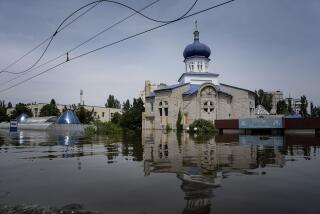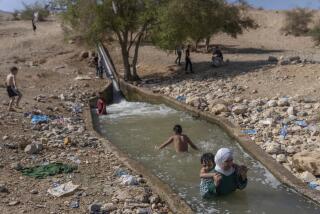Turkey Urges Regional Water Projects to Ensure Peace : Resources: Envoy says major programs would give Mideast nations an asset too valuable to risk.
- Share via
WASHINGTON — Offering his country’s ample water resources as bait, Turkish Foreign Minister Ahmet Kurtcebe Alptemocin said Friday that Middle Eastern countries could ensure lasting peace after the war by creating giant, region-wide water projects to give all nations a shared asset that would be too valuable to risk.
“We should try to find huge projects that would interconnect the countries of the region,” Alptemocin told reporters during a breakfast meeting at the Turkish Embassy. “This would eliminate the military option, because they would have mutual benefits to protect together.”
Turkey is the only country in the Middle East with water surpluses that could be shared with the parched nations of the largely desert region.
Even before the war broke out, Turkish President Turgut Ozal was scheduled to host a Middle East water summit in Istanbul next November. But the meeting takes on added urgency as the nations of the U.S.-led Persian Gulf coalition contemplate postwar strategies intended to prevent future conflict.
“Water is the most important resource issue facing the entire region,” said Joyce Starr, chairman of the Global Water Summit Initiative, which is sponsoring the Istanbul meeting. “There is no other issue that affects every aspect of life.
“These countries are agriculturally dependent, yet they haven’t the water to maintain their agricultural base,” she said. “It affects every aspect of their economic life and well-being, even more than oil.”
Starr said the summit will be attended by representatives of the World Bank, the U.N. Development Program and other international aid donors, as well as the countries of the region. So far, the Bush Administration has been lukewarm to the project.
“We have already had a very positive response from the region and the European Community,” Starr said in a telephone interview. “We are waiting to hear from the President of the United States.”
She said the summit will focus on water resources planning, institutional reforms, managing water supply and demand and pollution control.
Alptemocin, in Washington for Gulf War strategy talks with President Bush and Secretary of State James A. Baker III, said that every country in the region would benefit from a sharing of water and resource technology.
He said Israel has not been invited to participate, although Turkey would not object to including Israel, if the Arab countries of the region approved.
He conceded that it might seem illogical to try to exclude Israel from a project intended to reduce the chances of war by giving all countries in the region a common interest. Starr confirmed that Israel has not yet been formally invited. But she said Ozal’s vision “extends to the entire Middle East.”
“The summit isn’t just about moving water from Turkey,” Starr said. “Scarcity is one issue, but it isn’t the only issue. We are trying to convene all of the players to address the comprehensive problems that they face. We are putting into place a water security framework for the next century.”
Nevertheless, she said, Turkey is a vital participant because its rivers and high snow-capped mountains hold the region’s only supply of potentially exportable water.
“But (the Turks) have serious pollution problems,” Starr said. “Turkey needs help. They also have an old infrastructure that needs to be upgraded.”
The Middle East summit is the second regional meeting organized by Starr’s group. Representatives of 43 African countries met last June in Cairo.
More to Read
Sign up for Essential California
The most important California stories and recommendations in your inbox every morning.
You may occasionally receive promotional content from the Los Angeles Times.













